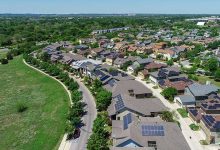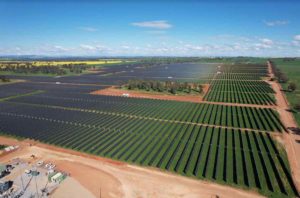Origin Energy has reported a massive 11 per cent drop in retail electricity sales for the first three months of 2020, as working-from-home arrangements caused by the Covid-19 pandemic see households use up more of their rooftop solar output.
Origin says in its quarterly production report that it has seen a drop in demand for electricity since a significant shift in the workforce to remote working arrangements, even though this happened relatively late in the quarter ending March 31.
Increased solar uptake has eaten into Origin Energy sales, and now with more people working from home during the day, households with solar installed are using more of their own solar generation. Normally, much of that output would be exported into the grid.
It reveals that while Australia’s overall electricity demand appears little affected by Covid-19 – which has cut around 20 per cent in other countries – some retailers may be more affected because of the sheer scale of rooftop solar installations, and the great self consumption.
Origin CEO Frank Calabria also attributed some of the drop in electricity demand to mild weather and an overall drop in Origin’s customer numbers.
“In Energy Markets, we are already seeing an initial impact from the pandemic on electricity demand, which along with milder weather and lower customer numbers and usage, contributed to lower volumes compared to this time last year,” Origin Energy CEO Frank Calabria said.

Overall increases in rooftop solar adoption, and energy efficiency measures, have also contributed to the decrease in retail electricity sales. As reported by One Step of the Grid, rooftop solar installations surged to new records in the first couple of months of 2020, before the impacts of Covid-19 reached their peak.
Origin says the impact on business sales of electricity showed a smaller impact, dropping by 3 per cent in the quarter, primarily due to the loss of business customers coming to the end of their contracts.
The outcome confirms an ongoing trend of declining electricity sales for Origin Energy. The company updated shareholders in February that it was experiencing falls in electricity sales due to increased solar uptake, combined with long-term outages at the Mortlake and Eraring power stations.
The company said that it had also seen a fall in wholesale electricity prices, driven by increased renewables uptake, falling demand and a plunge in global gas prices, dragged down by falls in oil prices.
“While earlier in the quarter saw extreme heat and bushfires impacting transmission and generation, average spot prices more broadly reflect increasing renewable generation, lower gas prices and milder weather generally, with lower spot prices toward the end of March caused by initial demand impacts from Covid-19,” Origin said in its update.
However, while the fall in energy use would be welcomed by most households, many energy groups have warned of potential spikes in electricity bills over the coming winter.
If many remain working from home over the coming winter, increased heating costs may lead to unexpected ‘bill shock’, and a collection of customer and community interest groups have warned households to expect higher costs.
“People are having to spend their time at home, pushing up energy costs when they are least able to pay,” head of energy policy at the Public Interest Advocacy Centre Craig Memery said. “Without better support, this winter many families face a choice between heating their homes and having enough money for food and rent.”
“Recent measures by energy retailers are welcome and necessary first steps in reassuring and supporting communities during this difficult period. But temporarily suspending disconnections and debt collection won’t stop winter energy bills for many households jumping by $200 a month as a result of COVID-19 related circumstances.”
In the quarterly update to the ASX, Calabria praised the work of Origin Energy employees, particularly their response to the Covid-19 disruptions.
“I’m incredibly proud of how our people have responded to COVID-19 and, in particular, I acknowledge those working in the field, at power stations and delivering LPG in roles critical to maintaining energy supply for our customers and communities. Our customer service teams are also working hard to make sure our customers having financial difficulties get the support they need.”
Origin also provided an update on the status of the stalled Beetaloo Basin project. Origin hit pause on the major new gas exploration project amid ongoing uncertainty, but has told the ASX the company has lifted its share in the project to 77.5 per cent.
“Reflecting our positive view of the potential of the resource, we have increased our interest in the Beetaloo Basin to 77.5 per cent and agreed changes to the joint operating agreement, providing greater control over the timing, direction and budgets for future project activity. We announced a temporary pause to exploration activity as a result of COVID-19, and look forward to when we can recommence activity,” Calabria added.
Australian energy companies have undertaken a range of measures to ensure a reliable supply of electricity is maintained, while also working to limit any potential spread of Covid-19.
Major energy companies, including Origin Energy, told RenewEconomy in March that they were undertaking measures to isolate key personnel, to ensure they remained fit and healthy to operate and maintain major power stations and energy systems.
RenewEconomy and the Smart Energy Council will be co-hosting a “virtual conference” on May 6, focusing on a renewables-led economic recovery, featuring industry leaders, analysts and advocates. More information and registration here.
RenewEconomy and its sister sites One Step Off The Grid and The Driven will continue to publish throughout the Covid-19 crisis, posting good news about technology and project development, and holding government, regulators and business to account. But as the conference market evaporates, and some advertisers pull in their budgets, readers can help by making a voluntary donation here to help ensure we can continue to offer the service free of charge and to as wide an audience as possible. Thankyou for your support.









